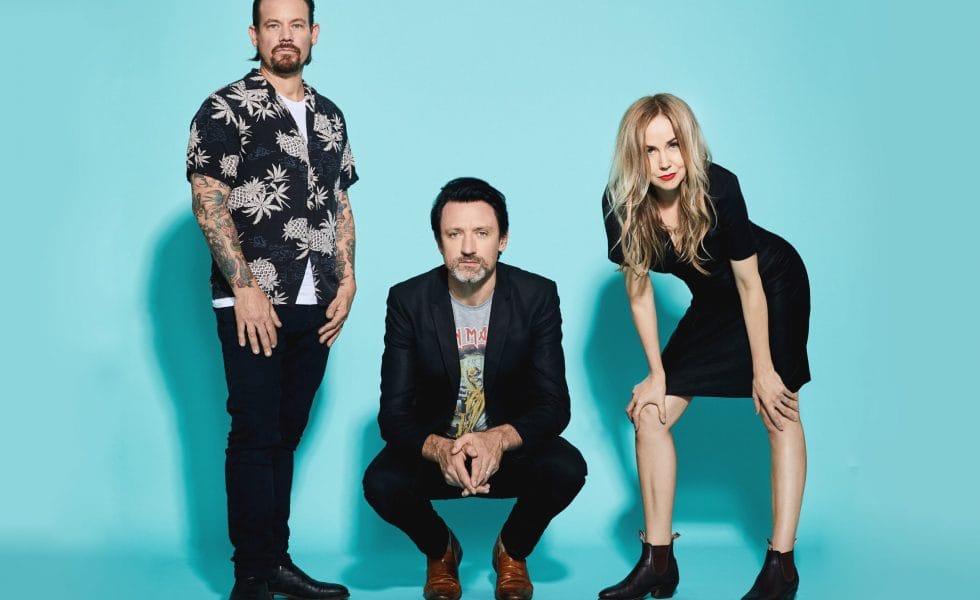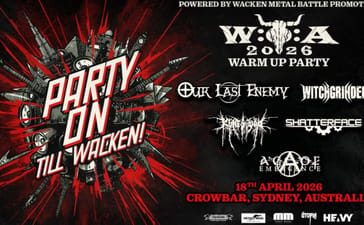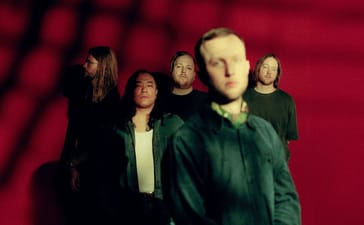Opening Up sees us talk to musicians about the opening track from each of their studio albums. Our next guest is Paul Dempsey, the frontman of Australian rock veterans Something for Kate.
You know how The Saints are credited with pioneering punk in Australia almost completely by accident? That’s Something for Kate with emo. The band have been opened up over 20-plus years in more ways than one – including on their most recent studio album, The Modern Medieval.
Paul Dempsey knows how to make an entrance. Be it in a physical manner (he’s six foot eight), kicking off a show or a side-one track-one as either a solo artist or at the helm of Something for Kate… no matter what, he’s mastered the art of getting you to pay attention. So, what does Dempsey like in an opening track as a fan, rather than as a songwriter? “That’s a good question,” he muses from his Melbourne home – which he shares with wife and Something for Kate bassist Stephanie Ashworth, as well as their son.
“I guess that the main thing is that you want to be immediately drawn in, don’t you? You’re hoping that the whole album is going to be a journey; that it’s going to take you places.” He reflects back on his own approach as it pertains to album structure, and how he’s intentionally deviated from the way others do it. “There are bands that put their most popular single or whatever first,” he says. “I take the complete opposite tact. I like to lay the groundwork with the first track – it needs to prompt you to hear what will immediately come after it.”
‘Anarchitect’ – Elsewhere for Eight Minutes, 1997
After a slew of EPs and singles following their 1994 formation, Something for Kate finally began work on their debut album. While in the studio – and without any semblance of how the record itself would be sequenced – the trio began to flesh out what would become ‘Anarchitect.’ Upon completing tracking, Dempsey liked the idea of putting it first. “It’s a very abrasive song,” he explains. “It’s a punch to the gut. Up to that point, we were known for pretty melodic stuff – almost poppy. ‘Anarchitect’ felt fresh to us. It didn’t feel like what people would be expecting from us – especially on our first album.”
The song’s distinctive guitar line is thanks to Dempsey’s emphatic use of layering. “I think it’s four guitars in total, and I used a different guitar each time,” he recalls. “It’s kind of unusual, and it’s disorienting straight away. Even at the start of the song, I’m not even really playing anything – I’m just running my hand up the fretboard. Everything about the song sort of throws you off – you have to find your footing pretty quickly.”
‘Whatever You Want’ – Beautiful Sharks, 1999
Despite Dempsey’s intentions to not put a popular single at the start of his albums, that’s exactly what happened with ‘Whatever You Want.’ It cracked the ARIA charts, it entered the triple j Hottest 100 and has remained one of Beautiful Sharks‘ key live staples. Of the band’s seven album openers, it remains their most popular by a considerable margin. Naturally, Dempsey had no vision of this happening when putting the record together all those years ago.
“I’m never really thinking about exactly what the reaction is gonna be,” he says. “You’re almost always wrong, so I tried to stop doing that very early on. I knew some proportion of fans would like it, just as much as I knew some wouldn’t. You can’t please everyone, and it’s futile to try. We honestly just liked the song. We thought it was different. It almost has a country kind of quality to it – which is certainly not something I would have ever entertained the thought of when we were making Elsewhere for Eight Minutes. It’s just how we evolved.”
The track is also notable for implementing a songwriting method made famous by Elton John’s classic ‘Tiny Dancer’: Not bringing in the titular chorus until after a few verses. Dempsey laughs when the comparison is made, noting that it’s not the first time he’s messed about with traditional song structure and it certainly won’t be the last. “Clint [Hyndman, drums] and Steph hassle me about this all the time,” he says. “They refer to it as ‘delayed gratification.’ The people at the label tease me about it, too. I just like taking my time to get to it!”
‘Stunt Show’ – Echolalia, 2001
In the midst of lockdown, Dempsey found himself unearthing an entire archive of recordings from across the years. “No better time to sort through all of it,” he reasons. Fair enough, too. In amongst all of it, he found a demo of ‘Stunt Show’ that caught his ear. “It’s mostly there, but when it gets to the chorus it’s this completely different chorus,” he says. “I’d totally forgotten that I’d even written it, to be honest with you. It lead me down a bit of a rabbit hole, and I found that this song in particular really did go through a lot of different iterations.”
Echolalia, the album which ‘Stunt Show’ opens, remains the most successful Something for Kate album to date. It was their first to go platinum and sported no less than three top-40 singles – the most famous of which, ‘Monsters’, was the runner-up in the 2001 Hottest 100. To hear Dempsey refer to Echolalia as “a turning point” feels like an understatement.
“We were realising our ideas to a fuller extent,” he says. “When I listen back to Elsewhere and Beautiful Sharks, I can pick out the half-formed ideas pretty easily. That’s not so much the case with Echolalia. Everything seemed like it was operating to its greatest potential. ‘Stunt Show’ felt exemplary of that – and, again, it felt different. We’d never opened a record with an acoustic guitar. I’d never sung falsetto like that before. It felt right to open the album that way.”
‘Max Planck’ – The Official Fiction, 2003
In case you’re not as well-read as Dempsey, Max Planck was a German theoretical physicist whose discovery of energy quanta won him the Nobel Prize in Physics in 1918. Did we just lift that verbatim from Wikipedia? You bet we did. Was this song written several years before Wikipedia was invented? You bet it was. Check out the brain on Dempsey, would you? Moving onto ‘Max Planck’ the song, as opposed to Max Planck the person, Dempsey is pretty open about the reasoning behind putting this song at the start of The Official Fiction: It’s a bigger-picture form of text painting. For those of you unaware, text painting is when a composition literally enacts part of its lyrics. You know when MC Hammer says “stop” in ‘U Can’t Touch This’ and the music stops? Like that. In this case, the first words you hear on the first song of The Official Fiction are: “So the start is my seat/At 37,000 feet.”
“This is a beginning,” says Dempsey. “This is where the story of this whole entire album begins. That was probably the biggest deciding factor. There’s also a pretty big backdrop to that whole record, though – it was written through the invasion of Iraq and Afghanistan. It’s definitely our most politically charged record.” So, how does Planck himself factor into this context? “One could argue he is a figure at the beginning of nuclear physics, quantum mechanics and things that would lead to the atomic bomb,” reasons Dempsey. “War was everywhere. It was on the TV. It made sense to process it like this. If any other song was at the start of this album, it would have felt like we’d gotten the chronology wrong.”
‘California’ – Desert Lights, 2006
While Dempsey and co. had worked on parts of their records in the US prior to making album number five, Desert Lights was their first time properly setting up camp Stateside. It also marked the longest creation period for a Something for Kate record up to that point: “We were in LA for six months,” says Dempsey, “and we were only supposed to be there for six weeks.” Part of the slowed process was to do with Dempsey hitting a wall, both mentally and creatively. Nearly a decade on the road without any real breaks from it had started to form cracks in the foundations of Something for Kate.
“I feel like my brain just kind of melted down,” says Dempsey. “Desert Lights is the sound of me trying to piece it back together. It’s quite a different record, and ‘California’ felt like a real declaration of that. It’s where we recorded the album, of course, and putting it first really sets the mood and gives you an idea of the stories to come.” One might think of the notion of the song ‘California’ being about California as pretty straightforward for a band that have been known to weave articulate and complex metaphors and analogies in the past. To that, Dempsey notes that it’s kind of the point. “I went through a pretty rough patch, so that album is just really focused on the catharsis,” he says. “It’s documenting this troubled time I had. I was just really focusing on how good it felt to just play guitar, more than anything – to circle back to reasoning I used earlier, ‘California’ opens with this great abrasive guitar part. It feels celebratory anytime we play songs from that record.”
‘Star-Crossed Citizens’ – Leave Your Soul to Science, 2012
Ask Paul Dempsey anything. He’ll tell you how any song was written, what any band was like to tour with, what his favourite Slayer songs are. Anything. Just don’t ask him about time signatures. “I truly have no fucking idea what time it’s in,” laughs Dempsey when queried about the dizzying stop-start nature of Leave Your Soul to Science‘s opening number.
“We’ve tried counting it out, but I never really think in those kind of measurements anyway. That said, if you see us play it live, you will probably see Steph and Clint looking at each other, counting along. It’s strange, but it feels pretty natural to me when I’m playing. It has its own flow to it.” ‘Citizens,’ which also served as Science‘s third and final single, was written by Dempsey all by his lonesome prior to the band arriving in Dallas to set up shop at producer John Congleton’s studio. Needless to say, the version Dempsey started with and the hard-hitting full-band version we ended up hearing on the record are like night and day. “It’s funny… it almost started out as a ballad of sorts,” Dempsey recalls.
“It was very gentle – purely just me on an acoustic guitar. After working with John for a few days, however, we decided to take it and do something crazy with it. Clint literally just smashed a crash cymbal all the way through the chorus – and when we wanted it to sound even weirder, we put three cymbals on top of one another and got him to smash that.” Want it weirder? It got even weirder: “While I was laying down the guitar part, John came over and put his hands on the tremolo arm,” adds Dempsey. “He started ramming it into my body with every chord I was playing! We did a trailer for that album, so there’s footage out there of John actually doing this.”
‘All The Great Minds’ – The Modern Medieval, 2020
Fans first got a taste of the song that would end up opening the new Something for Kate record when Dempsey did a small run of solo shows in mid-2019. Dempsey wasn’t certain that ‘All The Great Minds’ would be the opener of The Modern Medieval just yet, though – heck, this was even before they’d started recording, let alone settled on a tracklisting. So, how did it end up in this position? “I think it was a case of not knowing where else to put it,” muses Dempsey.
“Sometimes a song doesn’t make sense anywhere else. In this case, we liked the idea of it opening with this keyboard part – it just holds, and it’s on that same note for about 10 seconds. It felt different and it felt new. To me, it’s like a door opening. It forces you to find your feet a little bit, but it’s also quite pretty and soothing. It felt like an inviting way to start the album.” Dempsey was also drawn to the idea of having a striking lyric lead off the entire album. This isn’t to do with text painting, however. This is character building. “Richard, don’t make me come looking for you/In Los Angeles,” Dempsey sings as the drums kick in. You’re dropped straight in the story – you’ve never met Richard prior to seconds ago, and now you’re in his world. “To start the whole album invoking someone’s name… I kind of like that,” he says. “Once you’ve heard that line, you’re immediately invested. You want to hear the rest of the story.” If The Modern Medieval proves anything, it’s that Something for Kate still have plenty of stories to be told.














